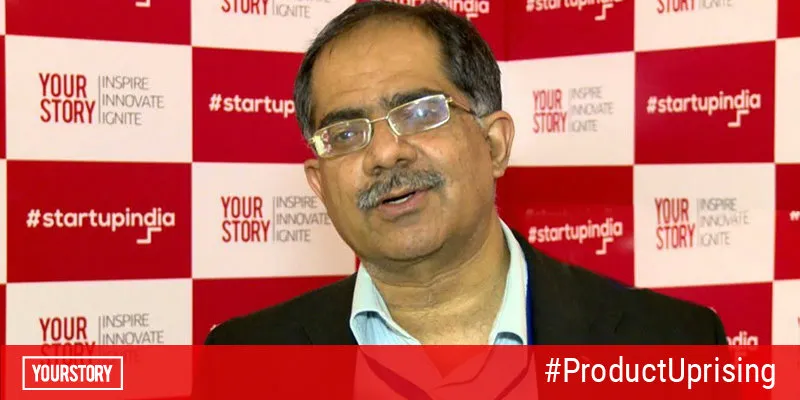Proper policy, not jugaad, needed for software products, says Sharad Sharma
India has traditionally struggled with software products as a domain, with few such companies emerging from the IT services shadow. Sharad Sharma, co-founder of software product think-tank iSpirt, tells YourStory – as part of its ongoing #ProductUprising series – that we need a mindset change. Excerpts from an interview:

YS: India has struggled to produce world-class product companies, at least not at the pace at which we have created IT services firms. What are the constraints? This topic has been debated over the years, but lots need to be done still. Your comments.
Sharad Sharma: There are basic gaps that exist at the ground level as well as in the ecosystem. At the ground level, some of our problems stem from our propensity to do "Jugaad", to throw people at problems instead of solving at scale with technology, to build products without garnering deep insights, to build interfaces instead of experiences, to copy trends from global leaders and missing on setting trends.
At the macro level, our small businesses prefer to receive personalised solutions rather than scalable products, this limits our market size for digital products. Our academia sets us up for competency with skills which has served well for the IT services and consulting firms, but does not fit well in a product nation and limits critical problem-solving skills. We celebrate funding as a success, and not as a means to the greater end. We limit our success thresholds to a lower quantum and lose momentum to go towards higher growth.
Yet the nation is moving towards a product inning. The Indian consumer’s appetite for better products and experiences is spreading. The Bharat market size is increasing beyond the levels of the metros. Top global startups operating in India are putting pressure on local players. There is an imminent inflection point in our market for digital and software products. A new breed to product entrepreneurs are jumping in to take advantage of this market shift.
YS: From a regulatory standpoint what can be done? Are there steps that the government can take to help improve the situation?
SS: A proper policy framework is coming as part of National Policy on Software Products.
YS: How do we create a "product culture" in the country? Do we need a mindset change?
SS: Yes, we do need a mindset change. While we need our entrepreneurs to get the basics of product thinking, we also need to develop an attitude of hunger, agility and urgency to understand a problem in depth, and solve it with a scalable approach.
YS: Since many of the software product companies have failed in the past, there are not enough role models for us to follow. Is this a challenge? Which are some of the product success stories that we can showcase to the world?
SS: In SaaS, Zoho and Freshwworks are role models. In enterprise software, Druva and Eka Software are startups to look up to. In developer tools, BrowserStack and Botmetric/Minjar are worthy of emulation. In payments, it is PhonePe that is setting the standard. Slowly but surely, role models are starting to emerge.
The product entrepreneurs in these companies illustrate these traits:
- Unlearning to overcome services baggage.
- Deep immersion in the problem and in the innovation platform (like AWS, India Stack, etc.).
- Not raising too much money.
- Full-stack founding team where tech, sales, product, and customer habits are present.
- Courage to break the mold/heresy and leverage a macro trend effectively.
YS: From an academic level, what needs to be tweaked to help create the "product culture"?
SS: Building a product thinking mindset instead of a product building skillset - asking questions, creative perspective, critical analysis, attention to data and details, customer empathy, platform thinking, communication skills, keen focus on product design...
YS: Many often say that we need to look at the Silicon Valley and understand from them how product companies are conceived... your comments?
SS: If we were copying the Valley model 100 percent, it would be mostly okay. The problem is we copy just enough and rest we make do with our "Jugaad" to make up for what we cannot copy effectively. Building product companies in India we do need to leverage our culture and our context to motivate and inspire the new entrepreneurs. This is not an easy problem to solve.
YS: How do you see the software/hardware product ecosystem in the country evolving over the next few years?
SS: The interlocking of better playbooks, market making, policy interventions and innovation platforms (like India Stack) has fallen in place last year. This will drive rapid evolution of the ecosystem. Several startups and big companies will fall by the wayside and new ones will thrive. From all this churn, two things will emerge. India will be to global SaaS what Israel is to cybersecurity, and Indian product entrepreneurs will solve problems of Bharat in a way that the innovations will travel to 6 billion people across the world.







